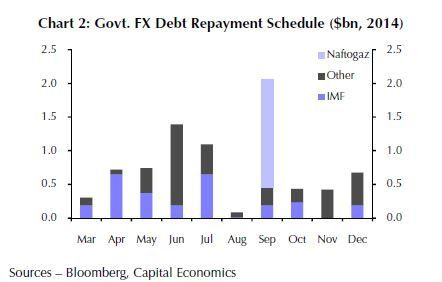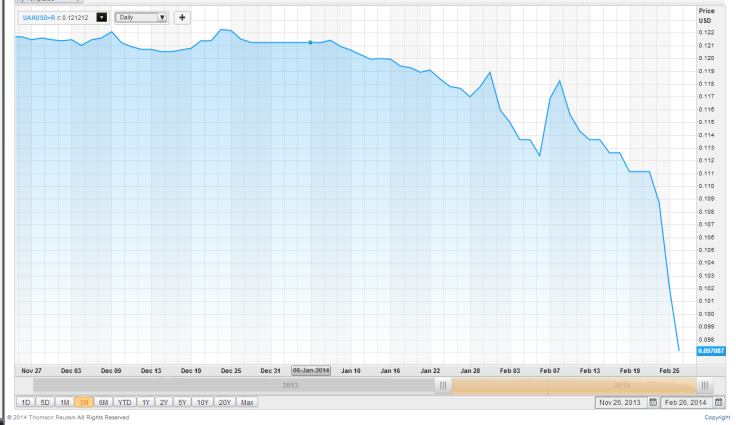Ukraine's Financial Challenge Is As Critical As Its Political Challenge: Without A Quick, Massive Cash Infusion, Ukraine Could Default On Its Debt
Analysis

Whether the Ukrainian coup that just ousted Viktor Yanukovych as president and left scores dead can avoid splitting the pro-Western north and west from the pro-Russian south and east is only one of the two critical challenges to Ukraine's survival. The other is whether the country's financial system will collapse.
The financial facts are as grim as the breakdown of civil society, bloody pictures of which have dominated the Internet for weeks. Without a quick infusion of tens of billions in cash, the country's central bank, the National Bank of Ukraine, will run out of foreign currency reserves and default on its sovereign debt. Complicating that is the fact that successfully meeting the financial challenge requires successfully meeting the political challenge.
Three financial risks
The total amount that public and private entities in the Ukraine owe outside lenders is about $66 billion this year. Some $46 billion of that is debt owed by corporate entities. However, the National Bank of Ukraine only has about two months' worth of foreign currency, about $15 billion, with which to service its debt. And that figure is falling fast: Ukrainians withdrew as much as 7 percent of all deposits over three days last week, according to Stepan Kubiv, the newly appointed governor of the National Bank.

The government has $6.2 billion of foreign currency-denominated principal and interest payments due during the rest of this year. Some $2.7 billion of that is due to the International Monetary Fund (IMF). In addition to that, the state-owned natural gas company, Naftogaz, has a $1.6 billion eurobond due in September and is currently $1.6 billion behind in payments to Russia's state-owned natural gas company, OAO Gazprom.
"All told, the government will need access to $9.4 billion of hard currency this year," London-based Capital Economics said on Tuesday.

The government's public relations machine has been busy putting the best possible face on the financial crisis.
"Let us note that, despite the three-month confrontation, the budget revenues grew by 12.2 percent last month to 22.5 billion hryvnias ($2.22 billion)," the government said Monday in a statement. "In fact, Ukraine is still on schedule with IMF payments. The confrontation has not affected the payments of external liabilities, but may affect the investment attractiveness."
The second pressing concern is that Ukraine's current account deficit is soaring.
"Assuming Gazprom revokes an earlier deal to provide gas at lower prices, we estimate that Ukraine will run a current account deficit (excluding the government's interest payments on foreign exchange debts) of around $13 billion to $14 billion this year," Capital Economics said.
The third issue concerns currency. The lower the country's foreign currency reserves fall, the more its own currency, the hryvnia, falls, and the less hard currency the government has. In February alone, the hryvnia fell about 18 percent (since Christmas Eve 2013, the hryvnia has fallen more than 20 percent). The more the hryvnia weakens, the more of that currency it will take to buy the hard currency, such as dollars or euros, that are necessary to service its debts.
The National Bank has taken steps to ease liquidity, including cutting in half the amount commercial banks have to keep on deposit with the central bank and easing commercial banks' access to overnight loans. Financial officials also have been meeting with foreign creditors and representatives from their treasuries, "to discuss the systems of governance, risks and capitalization," among other topics, according to a bank statement.
"In the short-term perspective, these measures will enable banks to mitigate a wave of excessive market sentiment triggered by the increasing demand for liquid funds," Olena Shcherbakova, who runs the National Bank's General Department of Monetary Policy, said Monday in what appeared to be a more aspirational than descriptive statement.

What's needed: two quick deals
Capital Economics says the country needs external financing on the order of $20 billion to $25 billion. There is hope that a financial rescue can be cobbled together; the U.S., the IMF and the European Union have telegraphed their willingness to help. But the question is how quickly this can happen.
The IMF said this week that it was working with the EU on an aid package.
"The amount of the aid is not disclosed, but Ukraine's Ministry of Finance announced that it would need about a $35 billion program," Bank of America Merrill Lynch Global Research said in a note. "The previously discussed IMF program was supposed to be $15 billion, and it is likely that the new arrangement would be about $15 billion to $20 billion, in our view, if agreed."
The financial challenge is linked to the political challenge: The more quickly a credible government can be sworn in, the more quickly global capital markets will stop grinding down the hryvnia. Like the financial challenge, the political challenge must be resolved quickly -- it needs to be settled within a matter of weeks, not months.
"If an IMF/EU deal is accompanied by a stable government and a credible commitment to reforms, it's plausible that capital inflows to Ukraine could pick up, reducing the need for outside help," said Capital Economics analyst William Jackson. "Equally, if the political situation spiralled out of control and banks and companies could no longer roll over external debts, Ukraine might need much more."
Even if the twin financial and political challenges are met, Ukraine is in for several years of rough going.
"The longer the political turmoil persists, the higher the risk that the worst-case scenario of a full-blown balance of payments and sovereign debt crisis materializes," UBS analysts said on Monday, adding, "We think that even if a solution is reached, most scenarios would still involve a lot of uncertainty over 2014-15 – and thus keep the sovereign risk premium volatile and business conditions highly uncertain."
© Copyright IBTimes 2025. All rights reserved.






















